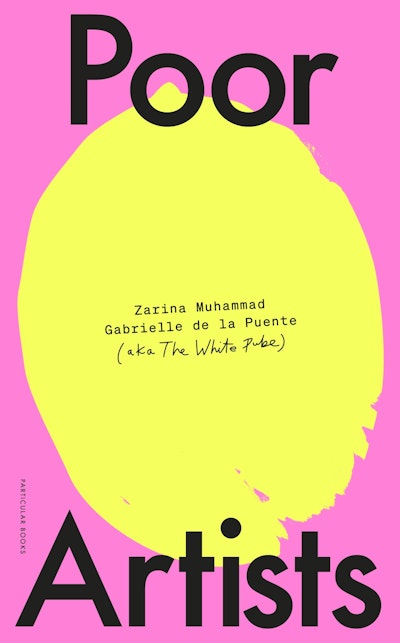Poor Artists
- Published: 3 October 2024
- ISBN: 9781802062526
- Imprint: Penguin eBooks
- Format: EBook
- Pages: 320
The art world memoirs for our Internet generation that none of us knew we needed but now we can’t live without. An indispensable read giving insights on an ‘art world’ at the edge of collapse. Living for it
Legacy Russell, author of <i>Glitch Feminism </i>
This book might change the way you look at art, or change the way you feel it . . . I love the energy, deep humour and alive thought in Poor Artists, which zooms through galleries, universities, a hospital ward, and a spaceship, capturing what is tragic, and what’s glorious, about art and the world right now
Daisy Hildyard author of <i>Emergency </i>
Gabrielle de la Puente and Zarina Muhammad have crept in through the back door of the artworld and left it open for the rest of us. This is a landmark for art writing — a treatise on the difference between art’s right to mystify and confound, and the crimes of an industry that discriminates and excludes
Nathalie Olah, author of <i>Bad Taste </i>
'I was surprised, challenged and affirmed - everything I love in a book . . . There are a lot of superlatives I could throw at Poor Artists, yet I finished the book overwhelmingly grateful that it exists. The White Pube continue to be a duo that add such a refreshing, thoughtful and critical but fun voice to an often stale art world. Poor Artists is that in tenfold
Travis Alabanza, author of <i>None of the Above</i>
Irreverent, provocative and funny . . . at some points it reads like a memoir and at others like a wildly surrealist novel . . . I found it fascinating as someone who knows basically nothing about the art world, but I’d also highly recommend it to anyone who went to art school or works as an artist – I’m sure the experiences it depicts would resonate deeply
Dazed
Excoriating and energising . . . interweaves impassioned real-world critique with an exuberant narrative that’s by turns satirical and surreal
Telegraph
Reads like a page-turning novel... What I love about this book is that it doesn’t descend into cynicism and despair, instead balancing the more challenging aspects of living a creative life (including, but not limited to, crippling student debt, predatory gallerists and dealing with rejection) with a full-throated defence of the inherent value of making, experiencing and talking about art
Chloe Stead, FRIEZE
A manifesto for hungry young artists
The Big Ship
A patchwork of myth... Fact and fiction blur, genres bend...If Poor Artists is poison for institutions, it is a tonic for the people. It’s for art students at orientation and computer programmers who can still remember the painting in their grandmother’s bedroom. It’s for job-seekers who wish they could sleep under their old Buffy posters instead of in front of their laptop
Skinny Mag
Through striking bathos and playful prose, Poor Artists takes us through the doors of a surreal and sometimes nauseating art world governed by myth, mysticism and strange rituals.. And yet, Poor Artists is not about simple nostalgia or authenticity. It is a story about power and alienation, success and compromise, creative survival and self-preservation
Alexandra Diamond-Rivlin, AnOther Mag
An aspiring young artist’s journey makes for a critique of the art world, in novel form . . . as it gathered pace, I could feel the strength and hopefulness of the authors’ narrative . . . The book is, at its heart, trying to get at the slippery, eternal problem of what art is
Eliza Goodpasture, Guardian
In a world where art is as much about capital as it is creativity, Poor Artists arrives like a Molotov cocktail in the gallery lobby... the book delivers its most striking message: true artistry can flourish beyond the industry’s broken framework
Dilsah Kondakci, Flux Magazine
A surreal yet gut punching insight into the often foggy world of art
Isaac Muk, Huck Mag
A scathing yet darkly humorous critique of the contemporary art world... It is not just a book for art world insiders, it’s for anyone who’s ever felt like a creative outsider trying to survive in a system that seems designed to eat you alive
Canvas Magazine
I am intrigued by the creativity of this book… A compelling object...the writers' playful and expanded approach to criticism straddles different literary genres
Sarah Long, Visual Artists' News Sheet
The self-styled cowboy critics shaking up the art world establishment . . . TWP illuminates the way art institutions alienate large swathes of the population, and magnify the structural inequalities of the wider world
Kitty Grady, Vogue
The White Pube have the energy and opinions to liven up an art world full of stale, male voices ... their frank political stance is clearly resonating with a younger audience in a way traditional art publications aren't able to
Katie Goh, Guardian




